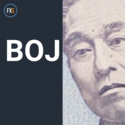In reaction to Thursday’s contemplation by Tomáš Holub from the Czech National Bank in the Hospodářské noviny daily over the possibilities of cutting rates below zero, the yields of Czech government bonds with shorter maturities fell into clearly negative territory. Thus investors have to pay for being allowed to lend their money to the Czech government. At the moment it is just a few basis points but it is probably appropriate to ask how far this situation (which is certainly convenient for the Czech Ministry of Finance) can go.
We should look for the answer to this question on the forex market, i.e., in the exchange rate of the koruna. If pressure on the Czech currency to appreciate persists, and if the CNB has to intervene and is compelled to buy even larger foreign currency volumes to add them to its forex reserves, this will boost the natural pressure on short-term interest rates to fall. If the CNB subsequently considers a possible increase in its forex reserves to be highly inconvenient, the central bank will have to resort to introducing negative interest rates in some way unless it wants to unleash the exchange rate (and let the koruna strengthen). Everything is legislatively complicated, as the CNB should not actually be allowed to charge negative interest rates – yet Thursday’s interview indicates that the CNB already knows how to circumvent even this. And how far should Czech interest rates possibly go? To alleviate pressure on the koruna at least slightly, the CNB should cut the Czech rates at which commercial banks deposit their money with the central bank to at least the level of the ECB deposit rate, i.e., -0.20%. It would probably be enough to cut the Czech rates to a few points below this rate. The Czech Republic is unlikely to need to drive its rates to the Swiss-Nordic extreme. Official rates in Switzerland and Denmark stand at -0.75%, Sweden’s repo rate stands at -0.35% and its deposit rate even at -1.1%!
Naturally, there is no guarantee that negative official interest rates will really be put in place in the Czech Republic. As described above, everything depends on the koruna and the growth of forex reserves, i.e., whether there will be any objections to a possible increase in forex reserves. Thus it is partly a self-fulfilling scenario, where the market speculations alone on this happening may actually trigger such a scenario. And predicting whether or not events like this will happen in the end is hard, indeed. No matter if this or that scenario happens, short-term koruna interest rates will be really very low for some time.
This non-exhaustive information is based on short-term forecasts for expected developments on the financial markets. KBC Bank cannot guarantee that these forecasts will materialize and cannot be held liable in any way for direct or consequential loss arising from any use of this document or its content. The document is not intended as personalized investment advice and does not constitute a recommendation to buy, sell or hold investments described herein. Although information has been obtained from and is based upon sources KBC believes to be reliable, KBC does not guarantee the accuracy of this information, which may be incomplete or condensed. All opinions and estimates constitute a KBC judgment as of the data of the report and are subject to change without notice.
Recommended Content
Editors’ Picks
AUD/USD stands firm above 0.6500 with markets bracing for Aussie PPI, US inflation

The Aussie Dollar begins Friday’s Asian session on the right foot against the Greenback after posting gains of 0.33% on Thursday. The AUD/USD advance was sponsored by a United States report showing the economy is growing below estimates while inflation picked up. The pair traded at 0.6518.
EUR/USD mired near 1.0730 after choppy Thursday market session

EUR/USD whipsawed somewhat on Thursday, and the pair is heading into Friday's early session near 1.0730 after a back-and-forth session and complicated US data that vexed rate cut hopes.
Gold soars as US economic woes and inflation fears grip investors

Gold prices advanced modestly during Thursday’s North American session, gaining more than 0.5% following the release of crucial economic data from the United States. GDP figures for the first quarter of 2024 missed estimates, increasing speculation that the US Fed could lower borrowing costs.
Bitcoin price continues to get rejected from $65K resistance as SEC delays decision on spot BTC ETF options

Bitcoin (BTC) price has markets in disarray, provoking a broader market crash as it slumped to the $62,000 range on Thursday. Meanwhile, reverberations from spot BTC exchange-traded funds (ETFs) continue to influence the market.
Bank of Japan expected to keep interest rates on hold after landmark hike

The Bank of Japan is set to leave its short-term rate target unchanged in the range between 0% and 0.1% on Friday, following the conclusion of its two-day monetary policy review meeting for April. The BoJ will announce its decision on Friday at around 3:00 GMT.